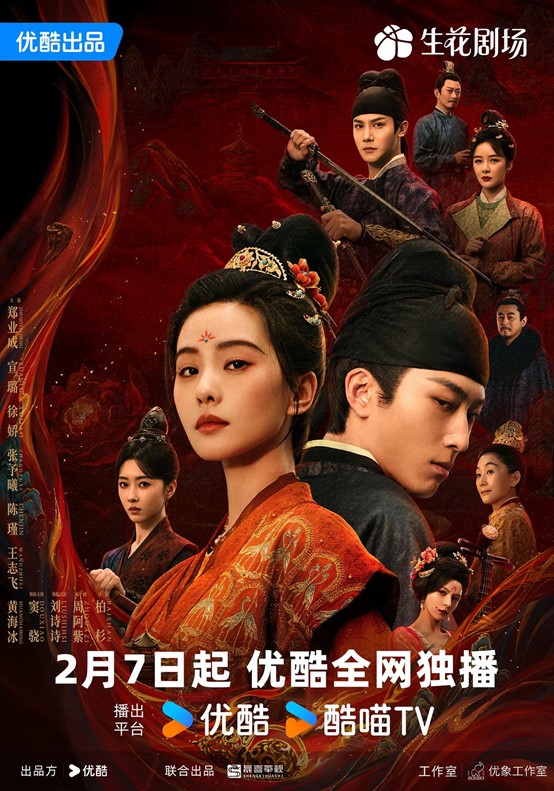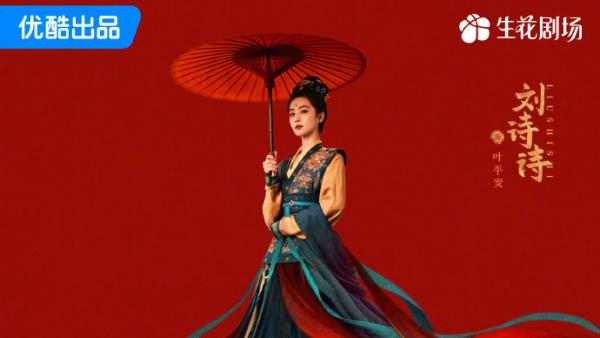
The period drama "Six Sisters", which was broadcast at the beginning of the year, focuses on the small city of Huainan, Anhui Province from 1949 to the early 21st century, telling the ups and downs of the fate of the six sisters of the He family in the changing times.
The online broadcast data of "Six Sisters" is good, and the ratings are even more gratifying. The CVB ratings have exceeded 4.7% (CVB prime-time ratings in a single day). This is not only because CCTV period dramas have a huge ratings base, but also because it has the basic qualities of a period drama that is worth watching.

"Six Sisters" TV ratings broke records
"Six Sisters" has a "historical" dimension. From the shortage of materials, shopping with coupons, and the tense atmosphere of the planned economy era, to the resumption of the college entrance examination, reform and opening up, and the economic development and social changes after reform and opening up, to the diversification and fast-paced life in modern society, these historical marks are presented through the lives of the characters in the play.
Older audiences can reminisce about the past through period dramas. Those familiar scenes, costumes, and lifestyles can easily evoke memories deep in their hearts and create an emotional resonance. Young audiences can glimpse the traces of changing times through period dramas and understand the atmosphere, social outlook, and lifestyle of historical periods that they have never experienced.
Period dramas also preserve the lives of ordinary people, which are rare on TV screens today. Over the years, the long drama market has been filled with stories about urban elites, ancient costume power struggles, and suspended sweet pets. It is not easy to see the down-to-earth daily lives of ordinary people. Period dramas are one of the few "fronts" for the lives of ordinary people, and many influential works have been produced, such as "Parents' Love", "Children of the Qiao Family", "The World", "The Glory of the Fathers", "People in the Alley", etc. These works can be called "epics of ordinary people".
"Six Sisters" is also in this category. The He family in the play is a typical civilian family. The head of the He family, He Changsheng (played by Liu Jun), responded to the call to support socialist construction and moved his family from Yangzhou Jiangdu to Huainan, Anhui, where he settled down. He worked in a leather factory under the Foreign Trade Bureau and repeatedly encountered difficulties from his boss, Da Lao Tang (played by Lin Yongjian). He was restricted by various factors in promotion and evaluation, and did not have any outstanding career achievements.

He Changsheng (played by Liu Jun)
In the era of material scarcity, the He family lived in poverty and were financially stretched. The family's food was often simple, such as steamed corn bread and soup. Occasionally, they felt it was very precious to have oil residue and Sanzi to improve their meals. The plot of buying daily necessities with tickets appeared many times, but in many cases, they could not buy them with tickets. For example, pork was in limited supply, and if you queued up a little later, you would not be able to buy it...
The biggest problem for the He family is having six daughters in a row. In that era when men were valued more than women, the idea of "raising a son to provide for old age" and "a boy should be the head of the family" was deeply rooted, and He Changsheng was no exception. He wanted a son, but his wife Liu Meixin (played by Wu Junmei) gave birth to six daughters in a row, and the He family was often ridiculed by others. The different personalities and growth trajectories of the six daughters also reflect the diversity of civilian life.

Liu Meixin (played by Wu Junmei)

The He family was ridiculed for having multiple daughters
Compared with other period dramas, the most unique setting of "Six Sisters" lies in its "all-female" family structure, which continues the matriarchal family narrative tradition of "Nine Phoenixes in the Family" and is novel in terms of gender perspective - the male characters in the play are more on the margins of the narrative, and the accidental death of He Changsheng and the functional existence of the sons-in-law together constitute a relatively pure space for women's growth, allowing the audience to feel the situation of women in the changing times more from a female perspective, as well as women's self-awakening and value realization in this process.
No matter how difficult an era is, the situation of women must be even more difficult. For example, Liu Meixin was under tremendous physical and mental pressure after giving birth to daughters many times. Facing her husband's loss, she was full of helplessness and self-blame; the eldest sister He Jiali shouldered a heavy pressure, having to endure her father's occasional neglect and take care of her younger sisters; the second sister He Jiawen married into the Chen family, and although her life seemed to be rich, the relationship between the sisters-in-law was not easy...

Mei Ting and Gao Lu play the eldest and second daughters of the He family. Both actors have good acting skills, but the age difference between them and their parents (Liu Jun and Wu Junmei) is not obvious. Liu Jun and Gao Lu have also played husband and wife.
The grandmother, mother and six sisters in the play show women's wisdom, responsibility and resilience in their own way. Grandma He Wenshi (played by Xi Meijuan) is very wise and gathers family members in a gentle way. She is the spiritual pillar of the family; Liu Meixin has to bear the responsibility of giving birth to and taking care of children, and also work hard at work, and struggles to find a balance between family and work; the eldest sister He Jiali shows maturity and responsibility beyond her age, gradually grows into the backbone of the family, and makes a lot of efforts and sacrifices for the family; the third sister He Jiayi did not fall into despair after experiencing bankruptcy, but seized the opportunity to stand up again...

The He family has been bullied by the eldest brother Tang's family. He Wenshi (played by Xi Meijuan) has no choice but to "threaten" in this way, which also reflects the tense atmosphere of the times.
As in "Nine Phoenixes in the Family", the relationship between women in a matriarchal family is always intriguing, with love, hate and vengeance intertwined. The six sisters of the He family have different personalities. They grew up in an era of scarcity and lack of opportunities. The uneven distribution of resources or the contrast between the sisters became the fuse of the conflicts between them, which gave rise to jealousy, complaints and quarrels.
For example, the third sister He Jiayi always likes to compare with the second sister He Jiawen. He Jiawen works well in the starch factory, is also the most beautiful girl in the factory, and has a smooth relationship; He Jiawen's work ability is not outstanding, and Ouyang Bao, who likes her, has a poor family background. Seeing the success of the second sister at work, He Jiayi feels a psychological gap and speaks coldly to the second sister.

The third sister is jealous of the second sister
Another example is when He Changsheng died unexpectedly and the company had a replacement vacancy. The fourth sister He Jiahuan and the fifth sister Liu Xiaoling were both eyeing this job opportunity. He Jiali thought that He Jiahuan was smarter than the fifth sister and suggested that she take the college entrance examination and give the quota to the fifth sister. This decision caused strong dissatisfaction among He Jiahuan. He Jiahuan cried and thought that her family did not treat her fairly, always giving way to the younger sister, which led to complaints and conflicts between the sisters.

The fourth and fifth sons quarrel over who will take over their father's job
Of course, "Six Sisters" will soon become a "family reunion". Even if they are still quarreling in one episode, they will reconcile warmly without having to wait until the next episode. And when one sister encounters difficulties, the sisterhood shows a strong power. Although there are frictions in life, the sisterhood that is thicker than blood cannot be severed.
For example, although the third sister is "jealous" of the second sister, she actually has the best relationship with the second sister and is closest to her; the fourth sister made a scene at home because of work, but after a little counseling, the conflict was resolved; the third sister got pregnant before marriage and was "kicked out" by the eldest sister. After the third sister gave birth, the eldest sister came to visit and gave money, and also explained that she was angry at the time because she was worried about the third sister. How can sisters hold grudges overnight...

Disputes between sisters are usually resolved quickly.
“Six Sisters” thus highlights the meaning of “home” – home is a safe haven in the wind and rain, a warm harbor where families always stick together and support each other no matter how many arguments they have experienced or how many difficulties they have faced over the long years; home is a spiritual home that gives each other courage, strength and hope under the impact of the torrent of the times, allowing people to continue to grow and move forward.
"Six Sisters" is generally very enjoyable to watch and very appetizing, but we must also objectively point out that compared with "Nine Phoenixes in the Family", or "Parents' Love" and "The World", it is a period drama that has been stripped of "impurities", and has done a lot of "purification" of the times and human nature, somewhat avoiding the complexity and cruelty therein.
For example, the drama’s presentation of the planned economy era, although it restored the appearance of material scarcity, was still too mild compared to the real era; the drama also alluded to the panic of a special era, but obviously downplayed the institutional repression and the distortion of interpersonal relationships, and the bullying of the He family by Mr. Tang was more due to personal grudges rather than systematic oppression... Such "soft light processing" or the requirements of external forces is more in line with the ratings needs of family-friendly dramas, but it also weakens the depth of historical reflection.

The He family's situation was considered "good" at the time.
The conflicts among the six sisters in the play are mostly limited to the "bickering" level, and the sisters are often "sharp in words but soft in heart", without the sharp conflicts and tensions in "Nine Phoenixes in the Family".
In fact, the portrayal of jealousy and framing between sisters in "Nine Phoenixes in the Family" is profound, which truly shows the multifaceted nature of human nature. In real life, although family affection is warm and deep, it is difficult to avoid conflicts. Human nature is not purely good, and the dark side will quietly emerge under the entanglement of interests and emotions. "Nine Phoenixes in the Family" breaks the idealized portrayal of family affection through these negative plots, allowing the audience to see the struggle of human nature in family affection. At the same time, the family is a microcosm of society. The conflicts between sisters reflect that money has penetrated into all aspects of people's lives during the period of social transformation after the reform and opening up, and interpersonal relationships, including family relationships, have become complex and subtle under the balance of interests.
In contrast, the "de-impurified" narrative of "Six Sisters" better highlights the warmth of family affection and family harmony, and simplifies the complexity of human nature. The family is a cooperative unit, but it is also a competitive field in many cases - especially in a family with many brothers and sisters, where the love and hate between each other are closer to the real normal. The avoidance of "negative" in "Six Sisters" makes it more like half a mirror of reality and half a family fairy tale.
Audiences who don’t like fairy tales will not give this drama a high rating. However, its amazing ratings on TV still show that in an era lacking adult fairy tales, nostalgic stories of “truth, goodness and beauty” can bring comfort to some audiences, and “Six Sisters” retains a warm utopia for them to project their emotions.


